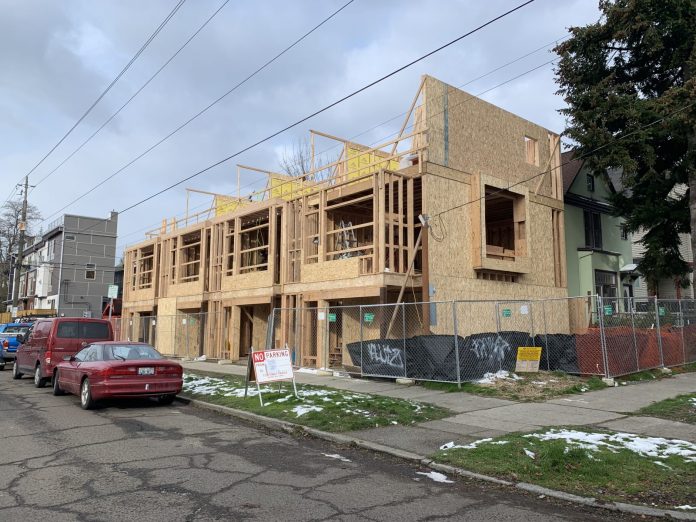House Bill 1923 would require that cities take action to increase both housing supply and affordability.
Rep. Joe Fitzgibbon of the 34th District has sponsored House Bill 1923, proposed legislation that seeks to increase the amount of affordable housing statewide through a two-pronged approach that directs cities to grow their housing supply while also addressing housing affordability.
“Affordable housing is needed everywhere,” said Rep. Fitzgibbon.”We need to remove impediments across the state so we can expedite bringing more affordable units online.”
Important details in the legislation remain to be determined. However, even as an early draft, the bill is distinct from other proposed housing bills for a few reasons.
Flexible Choices For How To Increase Housing Supply
Rep. Fitzgibbon felt that a bill that offered a more flexible approach would have a stronger likelihood of gaining legislators’ support. Thus House Bill 1923 offers cities a range of options to select from to increase their housing supply. Examples include:
- Increasing density near transit stations;
- Zoning for duplex, triplex, or courtyard apartment housing in current single-family zoned areas;
- Zoning for accessory dwelling units (ADUs) in single-family housing areas;
- Limiting on-site parking for new developments near transit;
- Adopting a comprehensive or subarea plan; and
- Adopting exemptions that encourage infill development.
It is notable that House Bill 1923 currently has much lower growth requirements than other proposed Minimum Density bills. Under Rep. Fitzgibbon’s bill, if cities decide to increase density near transit stations, they are only required to build 50 units per acre within a half-mile of a transit station, whereas in Sen. Palumbo’s proposed Senate Bill 5425, they are required to build a minimum of 150 units per acre within a half mile of a transit station.
However, House Bill 1923 would apply to more transit stations since it uses the term “fixed guideway transit station,” which refers to both existing and future light rail and bus rapid transit stations, whereas Senate Bill 5425 would only apply to new light rail stations built under Sound Transit 3.
Affordability Requirements
While many details remain to be determined, it is significant that Rep. Fitzgibbon’s bill requires cities act to create affordable housing. Like the broad range of options for increasing housing supply, his bill aims to give cities a similar level of flexibility in how they decide to create affordable housing.
Currently the only option described in the bill is an inclusionary zoning requirement which mandates that 25% of new housing be affordable.
Rep. Fitzgibbon recognizes that inclusionary zoning requirements can be controversial. Some proponents of market-rate housing solutions believe inclusionary zoning requirements actually increase the cost of housing by reducing supply.
Additionally, inclusionary zoning is not an effective affordable housing solution in all markets.
“It’s easier to enact successful inclusionary zoning in hot markets like Seattle than in cooler markets like Everett,” Rep. Fitzgibbon said. “In jurisdictions where the market is cooler, inclusionary zoning might act as an impediment to affordable housing creation.”
Rep. Fitzgibbon will be gathering input from cities and housing developers, both non-profit and for-profit, on other actions that cities can undertake to increase their supply of affordable housing.
“I want to ensure that some concrete actions are being taken, but not be so prescriptive on a statewide level we actually inhibit housing growth,” Rep. Fitzgibbon said.
An Umbrella of Provisions
Unlike some of Sen. Palumbo’s proposed housing bills, which address specific issues like minimum density near transit stations or creation of ADUs, House Bill 1923 is an umbrella bill that addresses a whole host of issues related to affordable housing.
Some of these include smaller provisions that could still have a measurable impact. One example is a cap on impact fees for multifamily housing development.
Some cities, like Federal Way, charge much higher impact fees on multifamily housing developments than on single-family housing developments. House Bill 1923 would bar this practice.
House Bill 1923 would also allow for some exemptions from SEPA (State Environmental Protection Act) appeals. The exemptions would apply in cases where the transportation impacts of a new housing development have already been addressed by a comprehensive plan or other local transportation plan. The goal would be to reduce duplicative appeals that slow housing creation.
Many Details Remain to be Determined
On Monday, the House Environment and Energy Committee will meet to discuss House Bill 1923. Fitzgibbon is optimistic that the conversation will generate productive feedback on parts of the bill, such as affordability actions, that still need more definition.
“We’ve had a lot of positive stakeholder conversations so far. I think we’ll have a pretty positive hearing on Monday,” said Rep. Fitzgibbon.
Moving forward it will be interesting to see how House Bill 1923 stacks up against other proposed housing legislation.
Lawmakers appear to be highly motivated to pass housing reforms this legislative season; however, it remains unclear what reforms will actually gain enough support to become law.
Natalie Bicknell Argerious (she/her) is a reporter and podcast host at The Urbanist. She previously served as managing editor. A passionate urban explorer since childhood, she loves learning how to make cities more inclusive, vibrant, and environmentally resilient. You can often find her wandering around Seattle's Central District and Capitol Hill with her dogs and cat. Email her at natalie [at] theurbanist [dot] org.



